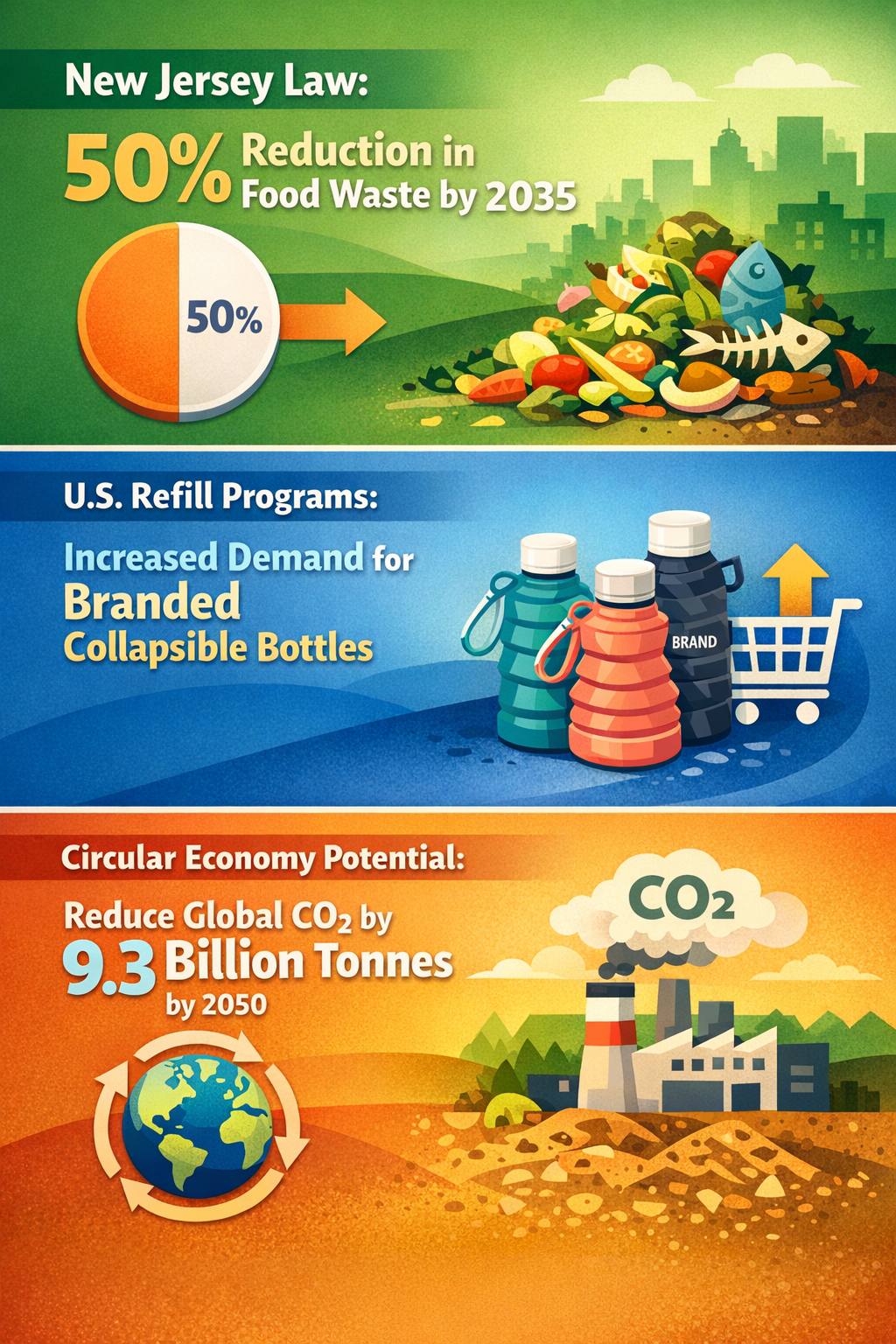Emerging Dynamics of Circular Economy Integration in Waste and Resource Management
The increasing convergence of regulatory frameworks and innovative business models signals a shift toward circular economy principles in waste and resource management. This shift is driven by emerging laws, corporate sustainability commitments, and evolving consumer behaviors. A weak yet compelling signal is the integration of circularity concepts not only in product design but across supply chains, energy systems, and urban infrastructure. These developments could disrupt traditional linear models of production and consumption within the next two decades, creating multifaceted opportunities and challenges for industry, government, and society at large.
What’s Changing?
The potential introduction of a federal, concurrent environmental law in Mexico as early as 2026 exemplifies regulatory momentum to harmonize national and state policies, which may tighten sustainability requirements across industries (NatLawReview). Should this law pass, companies might face mounting pressure to innovate in how they design products, manage waste, and control emissions, prompting a reevaluation of process efficiencies and circularity strategies.
Meanwhile, the built environment is undergoing a transformation rooted in circular economy principles. Research indicates that applying these principles could reduce embodied carbon emissions by approximately 13% by 2030 and up to 75% by 2050 relative to current construction methodologies (EnviroSustain). Notably, circular approaches in construction favor material reuse, modular design, and lifecycle extension, disrupting conventional project delivery and resource sourcing models.
At the consumer and event level, zero-waste strategies have catalyzed the rise of branded collapsible bottles in venues and stadiums across the U.S. (PersistenceMarketResearch). This demand reflects both cultural shifts toward sustainability and tactical B2B opportunities that align sports teams, festivals, and corporations with circular waste reduction goals.
Broader energy and waste management infrastructures are also evolving. The global trend towards circular economy frameworks is coupled with innovations in recycling technologies, smart metering, waste-to-energy conversion, and urban district heating networks. These developments support new energy-as-a-service models that decouple consumption from fossil fuel dependencies while integrating waste streams into energy use (Lexology).
Legislative innovation at the state level in the U.S. further exemplifies this trajectory. For example, New Jersey recently enacted a law mandating solid waste districts to achieve a 50% reduction in food waste by 2035 (WasteDive). Food waste composting and diversion initiatives are expected to pressure waste management entities to develop circular organic waste systems that benefit environmental and economic outcomes simultaneously.
Why Is This Important?
The amalgamation of these regulatory, technological, and market shifts may redefine how industries approach resource efficiency. Businesses embedded in manufacturing, construction, event management, and waste processing could face escalating compliance demands but also unprecedented opportunities to redesign products, services, and operations toward circularity.
For governments, the harmonization of fragmented policies under national frameworks could streamline enforcement and incentivize cross-sector collaboration, yet it may also expose gaps in capacity and funding. Adapting governance models to encourage innovation while ensuring equity and transparency will be crucial.
Consumers and corporate clients alike are likely to leverage sustainability commitments as differentiators, driving demand for circular products and services beyond regulatory compliance. This consumer-driven aspect may accelerate shifts faster than anticipated, particularly in regions where environmental awareness gains momentum.
Environmental impacts could be significant. Decreasing embodied carbon in buildings contributes to climate mitigation, while reducing food waste curtails methane emissions from landfills. Circular energy models might improve urban resilience, maximize resource utilization, and lower dependency on volatile fossil fuel markets.
Implications
The trajectory toward circular economy adoption suggests several implications for stakeholders:
- Industry Transformation: Companies should anticipate increased regulatory scrutiny and evolving market expectations, making early investments in circular design, waste reduction technologies, and energy-efficient infrastructures potentially decisive competitive advantages.
- Cross-sector Collaboration: Achieving the scale needed to shift entire supply chains and urban systems toward circularity may require new partnerships among manufacturers, waste managers, municipalities, and technology providers.
- Innovation in Business Models: The rise of energy-as-a-service and zero-waste venue programs highlight emerging models that recast waste as a resource and energy as a service—businesses able to embrace these models might tap into new revenue streams.
- Policy Alignment and Flexibility: Policymakers must design frameworks that can adapt to rapidly evolving technologies and market conditions while promoting transparency and ensuring fair access to circular economy benefits.
- Data and Measurement: The complexity of circular systems will necessitate advanced measurement tools—such as smart metering and lifecycle assessment—to quantify impacts and optimize processes continuously.
Proactive scenario planning should consider how these factors could converge differently across geographies and sectors. Scenario explorers may find value in modeling outcomes where circular economy integration accelerates rapidly versus where policy or market resistance slows adoption.
Questions
- How can organizations integrate circular principles early enough in product lifecycles to avoid costly redesigns under tightening regulations?
- What collaborative frameworks between public and private sectors might be most effective to scale circular economy initiatives across industries?
- In what ways can emerging circular business models—such as energy-as-a-service or waste-to-resource platforms—be structured to maximize economic and environmental value simultaneously?
- How will monitoring technologies and data analytics evolve to provide transparent, quantifiable insights into circular system performance?
- What risks arise if regulatory harmonization lags behind technological innovation in circular economy-related sectors?
- What incentives could governments develop to encourage small and medium enterprises (SMEs) to adopt circular practices without disproportionate financial burden?
Keywords
circular economy; resource efficiency; waste management; federal environmental law; energy-as-a-service; sustainable construction; food waste reduction
Bibliography
- The potential approval of a federal, concurrent law in 2026 may seek to harmonize national and state policies. National Law Review.
- Applying circular economy principles across the built environment could reduce embodied carbon emissions. EnviroSustain.
- Stadium and venue refill programs in the U.S. have increased demand for branded collapsible bottles. Persistence Market Research.
- Global shift toward circular-economy models unlocking opportunities in recycling, smart metering, waste-to-energy. Lexology.
- New Jersey bill requiring 50 percent food waste reduction by 2035. WasteDive.

